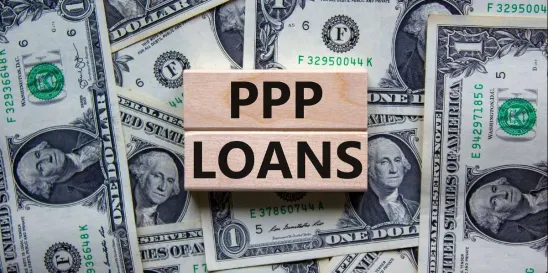Many small businesses continue to face uncertainty over whether the Small Business Administration (SBA) will grant forgiveness of their Paycheck Protection Program (PPP) loans. Despite the vast majority of small businesses receiving full forgiveness of their PPP loans, many loans remain unresolved with pending forgiveness applications, lengthy delays in SBA decision-making and unexpected audit risks. Potential SBA and US Department of Justice (DOJ) fraud investigations add to the pressure, with legal consequences and exposure lingering even after loan forgiveness. Some small businesses also grapple with inconsistent treatment by the SBA with the SBA’s reluctance to accept favorable appeal decisions from the Office of Hearings & Appeals (OHA), placing an additional burden on them. Amid these challenges, a recent update from the SBA provides a glimmer of relief for certain businesses utilizing third-party management companies.
IN DEPTH
1. Many PPP loan forgiveness applications are still in limbo at the SBA.
Some businesses are facing an increasingly common predicament: They appealed an unfavorable Final Decision to the OHA. The OHA granted their appeal, agreeing with the borrower that the SBA’s decision was based on clear error. The OHA then remanded the loan back to the SBA to conduct a new review, and the business is forced to wait for months for the SBA to act on the loan. Other borrowers are in a similar situation after filing an appeal with the OHA only to have the SBA withdraw the challenged Final Decision and place the loan back under review with no further communication from the SBA regarding the status of the loan. These businesses have been waiting and waiting for months—and in some cases more than a year—for the SBA to issue a new decision.
We have seen these scenarios play out time and again. The majority of SBA attorneys and loan specialists handling a borrowers’ appeals to OHA are committed to working with borrowers to reach the correct decision in a timely manner, but these SBA attorneys and loan specialists often lose control or oversight once a challenged Final Decision is withdrawn and goes back into what feels like a “black hole” of SBA review. The SBA likely lacks the resources and may not feel a sense of urgency to resolve outstanding loans in a timely manner. But many borrowers find themselves in limbo with a pending loan forgiveness application and an outstanding loan balance. This can cause significant issues for borrowers seeking to sell their business, obtain new financing to maintain or grow their business, or take other actions in the ordinary course of business.
So, what should borrowers do? Those that had a Final Decision withdrawn should update their lenders. Pursuant to 13 CFR 134.1202(d), a borrower’s loan repayment deferral period is extended until a final decision is rendered on the appeal. When a Final Decision is withdrawn by the SBA, borrowers have no obligation to begin making payments on the loan. Communication with lenders is also important for ensuring that borrowers are aware of any requests for documents or information that the SBA sends to the lender. The SBA will generally continue to communicate with borrowers through their lenders even after the OHA remands consideration of a loan back to the SBA.
Finally, borrowers can reach out directly to the SBA (or through their legal counsel or lenders) to request updates on their loan. While the SBA may not respond, such outreach demonstrates to the SBA that forgiveness of the loan is important to the borrower and places pressure on the SBA to expedite review. We have seen more than one instance where review of the loan slips through the cracks, and this proactive outreach causes the SBA to ensure that the review process is active.
2. Your PPP loan was fully forgiven years ago. Unfortunately, the SBA may circle back, audit and rescind a prior forgiveness decision.
We have seen a recent uptick in SBA reviews/audits of previously forgiven loans. The SBA has the authority to review and audit PPP loan and forgiveness applications for up to six years (for loans over $150,000) after it forgives the loan, and PPP borrowers must maintain documentation supporting their applications during this potential audit period.
These SBA reviews of forgiven PPP loans encompass both the borrower’s eligibility for the loan they received, the borrower’s eligibility for the full forgiveness amount and the borrower’s loan forgiveness calculations. The most frequent issues the SBA reviews seem to be whether the borrower correctly calculated its initial PPP loan amount and whether the borrower was “small” enough for the loan. These reviews usually require the borrower to submit tax returns and payroll information from as far back as 2018 and 2019, and they frequently request borrowers to collect and provide sensitive financial documents from other businesses the SBA deems to be potential affiliates even when the borrower has no control over those businesses or the ability to obtain the requested documents.
Unfortunately, it has become clear that loan forgiveness is not the end of the PPP loan journey for some businesses. Borrowers must be prepared to defend their eligibility for the loan they received and their eligibility for forgiveness of that loan.
This is important for mergers & acquisitions involving small businesses that had loans forgiven. Buyers may be stuck dealing with an SBA audit focused on decisions and documents from years ago in which the buyers were not involved. The takeaway for all borrowers is to maintain required PPP loan documentation and justification even if the loan has already been forgiven.
3. The government continues to scrutinize PPP borrowers.
The SBA and the DOJ have been closely scrutinizing PPP borrowers they believe may have fraudulently obtained a loan. The DOJ has brought criminal charges against hundreds of individuals for PPP loan-related fraud; many more criminal charges are likely to come. There also appears to be an increasing number of civil False Claims Act (FCA) investigations and lawsuits. The FCA is a federal law that prohibits knowingly making false statements or claims to obtain federal funds, and it carries significant penalties, including treble damages and civil penalties assessed per violation.
The government’s focus on PPP fraud stems from the sheer volume of loans disbursed and the potential for abuse. The SBA processed 11.8 million PPP loans, totaling $800 billion, which is a greater volume of loans than the agency processed in the prior 20 years combined. The SBA’s Office of Inspector General (OIG) stated in a June 2023 report that it believes as many as 17% of all PPP loans and Economic Injury Disaster Loans (EIDL) were disbursed to potentially fraudulent actors. The report said that OIG is working on tens of thousands of investigative leads on instances of possible fraud, waste and abuse and estimated that thousands of investigations will ensue for years to come. As of August 31, 2023, OIG’s PPP and EIDL investigative work has already resulted in 1,090 indictments, 906 arrests and 576 convictions. Congress increased the statute of limitations for PPP fraud to 10 years, meaning that potentially thousands of PPP borrowers will need to defend their decision to obtain PPP loans over the coming decade. The OIG report stressed that the government will look to potential instances of fraud even in instances where the loan has already been forgiven.
4. You “won” your appeal of an unfavorable SBA decision. What happens next?
We have recently encountered an unsettling trend for borrowers: Even an OHA opinion finding that the SBA’s Final Decision was based on clear error of fact and law may result in the SBA digging in its heels and issuing a new Final Decision based on the same errors or on issues that seem to come out of nowhere.
In most instances, the SBA will do the right thing and go back and properly evaluate the loan, taking into consideration OHA’s opinion. The SBA will request any additional information it needs and work cooperatively with the borrower to determine the forgiveness amount the borrower is eligible to receive. However, we have seen borrowers prevail before the OHA only for the SBA to issue another Final Decision denying the borrower’s forgiveness application on different grounds (and even one case where the SBA inexplicably denied forgiveness on the exact same grounds the OHA found to be clear error).
This recalcitrance by the SBA places a significant burden on the small businesses that must time and time again defend their eligibility for loan forgiveness. Often, the SBA’s repeated denials of the borrower’s forgiveness application contain little detail as to the reason behind the SBA’s denials, forcing the borrower to guess at the SBA’s reasoning. Such guesswork and uncertainty result in increased expenses and time spent on attempts to get the SBA to reconsider its denials. This takes a real toll on small businesses that should be spending their time and money on maintaining and growing their business.
5. Beware of debt collectors.
The SBA’s rules permit PPP lenders to request that the SBA purchase the expected forgiveness amount of a PPP loan. As a result, some borrowers will find that their loan is held not by the lender that issued the loan but by the SBA itself. Unfortunately, the SBA and the US Department of Treasury are now dispatching private debt collection agencies to try to collect “unpaid” PPP loan debts from small businesses that have no repayment obligation, are unaware that they have outstanding debt, or have tried in earnest to work out a repayment plan with their lenders or SBA/Treasury but have been given the runaround. This is putting struggling small businesses in a devastating and unnecessary position.
6. There is some good news from the SBA.
There is one category of PPP borrowers that can breathe a sigh of relief: businesses that utilized third-party management companies to employ their workers. This arrangement is especially common in the hotel business where a management company technically employs the individuals who work for the hotel, but the hotel itself funds the management company’s payroll. Earlier this year, the SBA sought to claw back some PPP loans that were issued to borrowers that used third-party management companies for payroll on the grounds that the borrowers were not actually the technical employer of the employees.
Thankfully—and wisely—the SBA reversed course on these targeted borrowers and issued its 72nd Frequently Asked Question (FAQ 72). FAQ 72 provides that the amounts paid by a borrower to a third-party payer for the third-party payer’s employees to operate the borrower qualify as eligible payroll expenses for the purpose of calculating the maximum PPP loan amount. Per FAQ 72, such payments qualify so long as the management company did not itself apply for and receive a PPP loan. Borrowers in this type of situation should ensure that their management companies did not apply for a PPP loan based on payroll to employees that the borrower also counted in its own PPP loan application.





 />i
/>i

